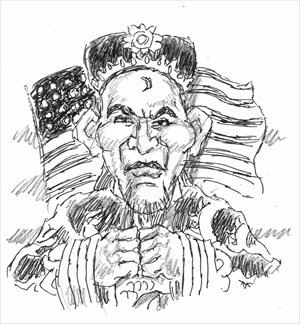1001 Chinese Tales: Subtlety of Chinese politics, humor in US petitions

Photoshopped images of Barack Obama dressed like Bao Zheng, a highly praised judge who served during China's Northern Song Dynasty (960-1127) and presided over many mysterious and difficult cases for the good of ordinary people, have recently been circulating widely online. The accompanying slogan, "Have any cases that are hard to crack? Seek help from Obama!" has become particularly popular on the Chinese Internet.
A growing number of petitions from Chinese have been cramming the official petition website of the White House over the past few days. On May 3, a Chinese-American living in Florida posted a "We the People" petition on the website, calling for attention to a 19-year-old unsolved poisoning case known as the Zhu Ling case in China.
Zhu was poisoned with thallium, a toxic element often used in rat poison, in 1994 while studying chemistry at Tsinghua University. The promising scholar was left almost blind, paralyzed, diabetic and brain damaged, leading to a life of torture over nearly 20 years.
The main suspect, Zhu's roommate Jasmine Sun, or Sun Wei, is believed to be residing in the US under an assumed name.
The petition on the White House website demands that the US government extradite Sun. In the wake of a similar poisoning incident that killed a student at Fudan University in Shanghai last month, Zhu's case has resurfaced in the minds of the Chinese.
Attention for the petition sparked a firestorm of petition-signing among Chinese netizens after it was widely circulated on Weibo and other popular online forums in China. Within three days of its appearance, the number of signatures crossed the threshold of 100,000 that requires a response from the Obama administration.
After seeing the issue come under the international spotlight, many Chinese netizens flooded the We the People petition platform with a staggering variety of pleas, regarding, for example, the official taste of a type of tofu and the replacement of talentless players on the Spanish football team Real Madrid. Some are even using the platform to find a date.
There are also serious petitions. One item that appeared on Sunday asks the US to bawl out the Chinese government over a paraxylene, or PX, project in Kunming, Yunnan Province, which attracted a flurry of signatures.
It appears that the White House website became a virtual wishing well overnight. However, I have a hard time believing that the petitioners really think Obama will appoint a "minister of China Petitions" and that the White House will act as "China's foreign bureau for letters and calls."
Many petitioners are using the site as an outlet for satire to express frustration over China's petition system, while meanwhile, others are crowding the While House website to mock the US. "Don't you call yourself a global policeman?" one Chinese petitioner wrote online.
In fact, many are well aware that petitioning the White House is not likely to yield practical help and they don't support a US petition to solve domestic problems, including the parents of Zhu Ling. Although the petition to the White House rekindled the public's demand for justice for their daughter, Zhu's parents said they prefer the case be solved through regular channels rather than participating in or supporting the petition process.
Most Chinese loathe the idea of foreign intervention in China's domestic affairs, as evidenced in the collective outcry that ensues when a country blindly points a finger at China. However, we are also not unfamiliar with cases involving desperate petitioners seeking external help, such as from influential Western press. The so-called occupation of the White House petition website is merely the latest example.
When justice is thwarted regarding an official probe, people have to resort to extravagant measures to make their voices heard. Utilizing foreign pressure to embarrass the government is considered as the last resort.
In a word, the bombardment of the White House petition website constitutes the opening of the floodgates of Chinese public opinion, and the humor with which some approach the process reflects their mockery of the domestic system. If Chinese authorities simply laugh it off while overlooking the growing discontent reflected in the more serious petitions, the embarrassing foreign petitions will not die down. On the other hand, if foreign entities take it seriously and use it an excuse to deal a blow to China, they're missing the point too.
The author is a reporter with the Global Times. yujincui@globaltimes.com.cn